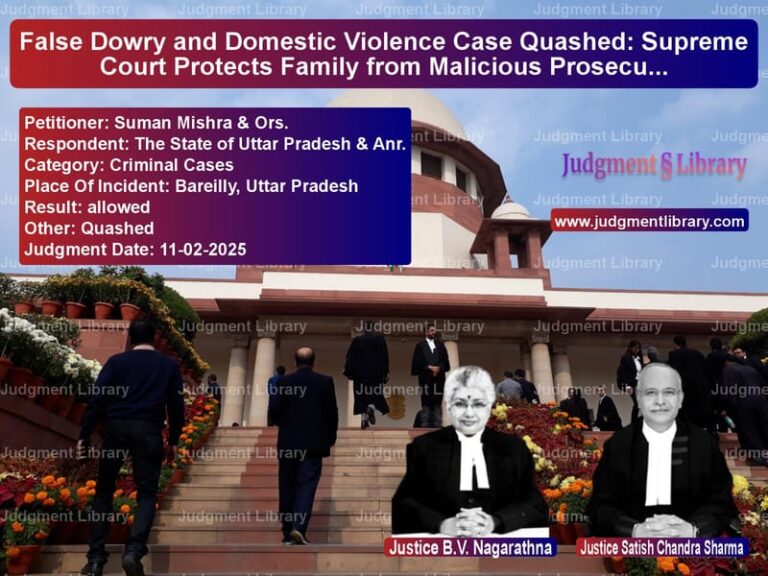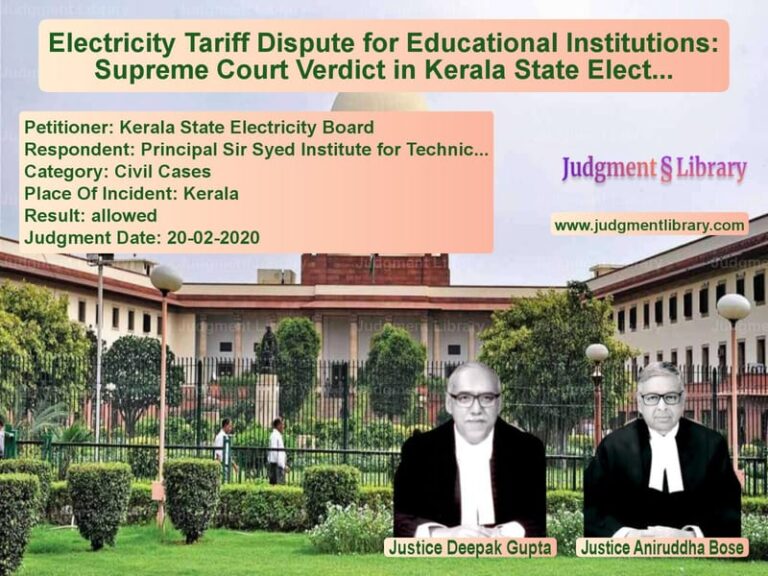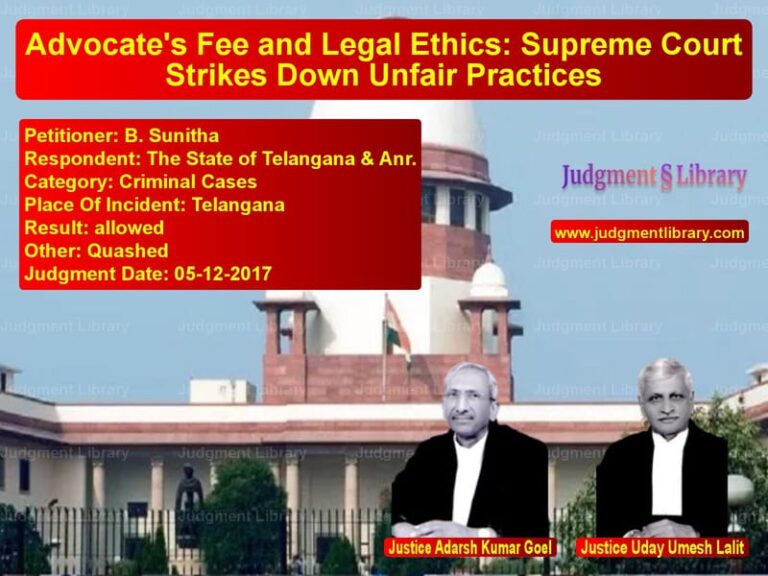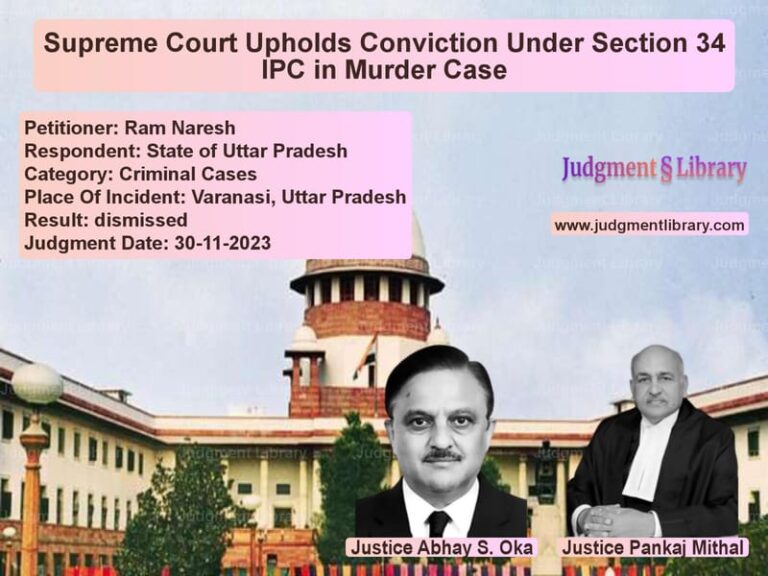Supreme Court Restores Criminal Proceedings in Cheque Bounce and Fraud Case
The Supreme Court of India, in the case of Riya Bawri & Ors. v. Mark Alexander Davidson & Ors., reinstated criminal proceedings under the Negotiable Instruments Act, 1881 (NI Act) and the Indian Penal Code, 1860 (IPC) against a former partner of a firm that had issued dishonored cheques for rental payments. The Court ruled that the High Court had erred in quashing the complaints against the respondent, as the issue of his liability required examination at trial.
Background of the Case
The case arose from a dispute regarding rental payments for a property in Byrnihat, Meghalaya. The petitioners, who owned the property, had leased it to the respondents’ firm. Over several months, the respondents issued multiple cheques to cover rent payments, but all were dishonored due to insufficient funds.
The timeline of the events leading to the Supreme Court’s intervention is as follows:
- July 11, 2015: The property was leased for a monthly rent of ₹1,45,152/-.
- April – October 2019: The respondents issued a total of 22 cheques to cover rent payments.
- December 9, 2019: The petitioners sent a legal notice under Section 138 of the NI Act demanding payment.
- February 2020: The petitioners filed criminal complaints under the NI Act and IPC after no payments were made.
- March 14, 2022: The Meghalaya High Court quashed the complaints against respondent Mark Alexander Davidson.
- August 23, 2023: The Supreme Court overturned the High Court’s decision and restored the complaints.
Key Legal Issues Considered
- Whether the High Court was justified in quashing the criminal complaints at a preliminary stage.
- Whether the respondent, a former partner of the firm, could be held liable for dishonored cheques issued after his alleged resignation.
- Whether the petitioners had sufficient evidence to sustain criminal proceedings against the respondent.
Arguments by the Petitioners
The petitioners, represented by Senior Advocate XYZ, argued:
- The firm had issued 22 cheques between April and October 2019, all of which were dishonored.
- Despite serving a legal notice under Section 138 of the NI Act, no payments were made.
- The respondent claimed to have resigned from the firm on April 1, 2018, but a public notice confirming his resignation was issued only in February 2022, much after the complaints were filed.
- The trial court had properly taken cognizance of the complaints, and the High Court erred in quashing the proceedings without allowing the trial to examine the evidence.
Arguments by the Respondents
The respondents, represented by Advocate ABC, contended:
- The respondent had retired from the firm before the cheques were issued and had no involvement in the transactions.
- The public notice of his retirement, though issued later, was not required to establish his non-liability.
- The High Court correctly quashed the complaints as the petitioners failed to produce prima facie evidence linking the respondent to the dishonored cheques.
Supreme Court’s Analysis and Judgment
1. The Role of the High Court in Quashing Criminal Complaints
The Supreme Court held that the High Court had exceeded its jurisdiction by interfering in the trial process:
“The High Court, at the stage of summoning, should not have evaluated the evidence and made conclusive findings. The trial court had sufficient grounds to summon the accused.”
2. Determination of the Respondent’s Liability
The Court observed that the respondent’s claim of retirement needed to be tested at trial:
“The Retirement Deed dated April 1, 2018, is a self-serving document that must be proved during trial. A public notice was issued only in February 2022, much after the complaints were filed.”
3. The Necessity of Trial for Establishing Criminal Liability
The Court emphasized that the petitioners had made specific allegations against the respondent:
“As the petitioners have alleged that the respondent was in charge of the firm when the rent agreement was executed, he must face trial unless he produces unimpeachable evidence of his non-involvement.”
4. Application of Section 138 of the NI Act
The Court reaffirmed that criminal liability under the NI Act extends to persons responsible for the company’s affairs at the time of cheque issuance:
“Under Section 141 of the NI Act, every person in charge of the firm’s affairs at the time of the offense is deemed guilty unless proven otherwise.”
Supreme Court’s Final Decision
The Supreme Court ruled in favor of the petitioners:
- The High Court’s order quashing the complaints was set aside.
- The criminal complaints against the respondent were restored.
- The trial court was directed to proceed with the case and examine all evidence before determining liability.
Conclusion
This ruling reinforces key legal principles:
- High Courts must not interfere prematurely: The trial process must be allowed to run its course.
- Corporate officers cannot escape liability easily: Mere claims of resignation must be substantiated.
- Negotiable Instruments Act must be strictly enforced: Dishonored cheques constitute a serious financial offense.
This judgment ensures that financial fraud through dishonored cheques is dealt with strictly, preventing misuse of legal loopholes to evade accountability.
Petitioner Name: Riya Bawri & Ors..Respondent Name: Mark Alexander Davidson & Ors..Judgment By: Justice Hima Kohli, Justice Rajesh Bindal.Place Of Incident: Byrnihat, Meghalaya.Judgment Date: 23-08-2023.
Don’t miss out on the full details! Download the complete judgment in PDF format below and gain valuable insights instantly!
Download Judgment: riya-bawri-&-ors.-vs-mark-alexander-david-supreme-court-of-india-judgment-dated-23-08-2023.pdf
Directly Download Judgment: Directly download this Judgment
See all petitions in Fraud and Forgery
See all petitions in Cheque Dishonour Cases
See all petitions in Judgment by Hima Kohli
See all petitions in Judgment by Rajesh Bindal
See all petitions in allowed
See all petitions in Remanded
See all petitions in supreme court of India judgments August 2023
See all petitions in 2023 judgments
See all posts in Criminal Cases Category
See all allowed petitions in Criminal Cases Category
See all Dismissed petitions in Criminal Cases Category
See all partially allowed petitions in Criminal Cases Category







